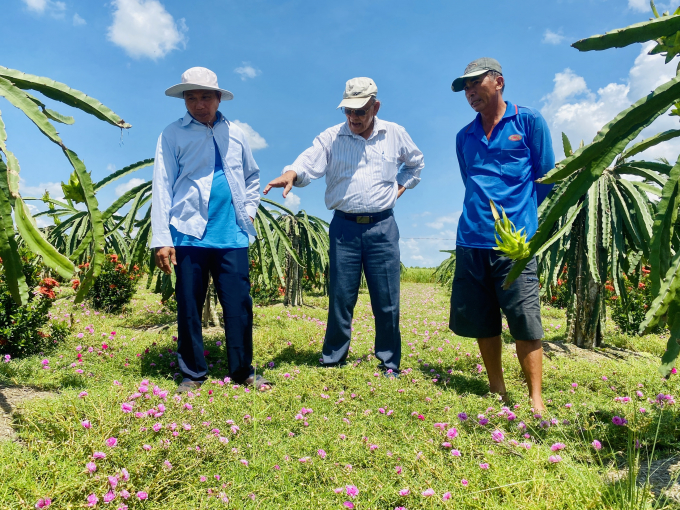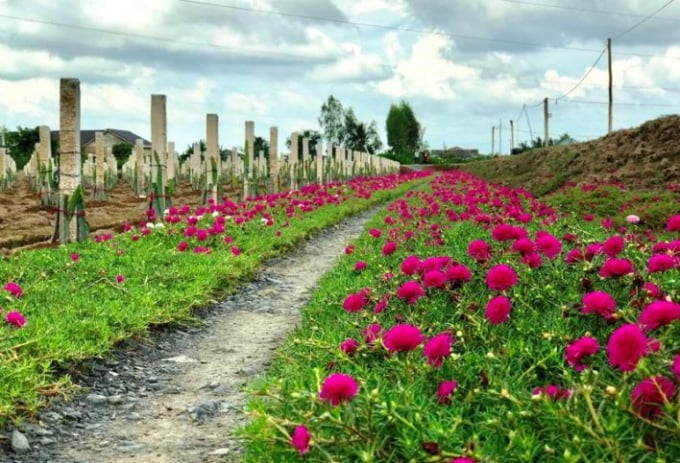November 28, 2025 | 08:23 GMT +7
November 28, 2025 | 08:23 GMT +7
Hotline: 0913.378.918
November 28, 2025 | 08:23 GMT +7
Hotline: 0913.378.918

Prof Nguyen Tho ( centre) visits and avaluates the effects of growing Portulaca grandiflora in green dragon fruit farm in Long An province. Photo: Thanh Tam.
Abusing chemical fertilisers and pesticides in agriculture production resulted in soil degradation which then caused diseases for crops, said Nguyen Tho, vice president of Vietnam Plant Protection Association.
Tho said that a major cause of the soil-relating diseases was the strong growth of harmful microorganisms in the soil.
“Adding organic matters to the soil is a top solution to prevent and control plant disease,” he said.
When chemical fertilisers and pesticides were used too much and organic fertilisers were hardly used, the soil would be degraded.
Harmful microorganisms could take food from both soil and plants, he said, adding that if soil fertility declined, the harmful microorganisms would take food from plants and weaken the plants.
The thrive of harmful microorganisms in soil caused diseases for crops such as citrus greening disease or root rot disease, he said.
He added that when pathogens lived deep underground, it was difficult to control.

Portulaca grandiflora is grown in green dragon fruit farm. Photo: Thuy Nguyen.
“If chemical fertilisers are continued overusing, we would never prevent and manage plant diseases sustainably,” he said.
Prof Tho said that it was necessary to return or add organic matters to the soil.
For examples, in the southern province of Long An, farmers grew Portulaca grandiflora in green dragon fruit farms.
With the flower, farmers used fewer pesticides, fertilisers or plant protection products. Moreover, green dragon fruit plants were seen to grow well.
Even during droughts or saltwater intrusion, the green dragon fruits with Portulaca grandiflora below were still growing well, Tho said.
Growing wild peanut to cover soil was also another effective measure.
In Di Linh District of the Central Highland province of Lam Dong, a local farmer grew wild peanut under his coffee trees.
Scientists from the Netherlands, who are studying about sustainable agriculture environment, for many times, took soil samples from the farm for their analysis.
They found that soil in that farm was much more productive and fertile than those in other coffee areas which are without wild peanut.
During droughts, thanks to the wild peanut covering the soil, it was no need to water the coffee.
The mealybug did not climb up the coffee trees, but hid under the canopy of the wild peanuts, so the coffee was not harmed by it.
“It is very necessary to encourage farmers to apply organic farming methods in agriculture production,” Tho said.
During the past time, when it came to organic farming in Viet Nam, organic products were paid much attention, he said.
“It’s great when organic farming produces organic products but it is not enough,” Tho said.
“More importantly, organic farming will increase organic matters, return the organic matters to the soil. Thus, it helps increase soil fertility and ensure biodiversity in soil,” he said.
The agriculture professor said that generally, farmers knew how to return organic matters to the soil.
“The thing that matters here is communication. Authorities need to enhance communication about sustainable farming through the network of agriculture promotion centres across the country,” he said.
In addition, it was a must to limit the use of chemical products in cultivation.
If using such products, it was necessary to use them properly and products that are friendly to the environment should be given priority, Tho said.
The use of probiotics in agriculture has been emerging across the world to increase soil fertility.
Probiotic is used in composting organic fertilisers. Probiotic is also watered on agriculture waste to speed up their decomposition process.
Probiotics are available in human and animals, helping people and animals increase immunity and fight against disease-causing microorganisms.
When human and animal discharged probiotic into the environment, the probiotic would add nutrients to the soil and help create an ecosystem balance in which useful microorganisms and antagonistic microorganisms could beat harmful microorganisms.
To crops, probiotic was considered “a midwife” that brought food to the plants easily, thus help improve the plants’ immunity system. Further, probiotics from food went back to the human body, Tho said, adding that probiotic underwent a circulation.
AAuthor: Thanh Son. Translated by Hien Anh. Edited by Đức Huy.

(VAN) Circular agriculture helps Mekong Delta farmers cut greenhouse gas emissions while boosting incomes through efficient reuse of agricultural by-products.

(VAN) According to Mr. Vo Minh Thanh, Director of the Tay Ninh Department of Agriculture and Environment, Resolution 57 has created a new development pathway for the locality, shifting from traditional toward modern agriculture.
/2025/11/26/4909-2-154329_878.jpg)
(VAN) Pearl grouper farming in HDPE cages not only delivers economic efficiency but also contributes to protecting the environment, creating jobs, and promoting marine-based experiential tourism.

(VAN) The model of making a living under the forest canopy through the agroforestry system in Van Son commune, Bac Ninh province, is expected to generate an annual income of approximately VND 30 million/ha.

(VAN) Many enterprises in Can Tho are harnessing natural energy and reducing greenhouse gas emissions in their production processes, thereby contributing to the promotion of a sustainable green transition.
/2025/11/24/3536-2-112800_176.jpg)
(VAN) Dong Nai now has tens of thousands of hectares of forests certified for sustainable management, and this area will continue to be expanded in the coming period.

(VAN) Vinh Ha hamlet (Dai Xuyen commune, Hanoi) is shifting away from small-scale farming as households adopt bioscurity into their breeder chicken models.